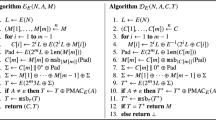Abstract
The idea of combining a very simple form of added plaintext redundancy with a special mode of data encryption to provide data integrity is an old one; however, despite its wide deployment in protocols such as Kerberos, it has largely been superseded by provably secure authenticated encryption techniques. In this paper we cryptanalyse a block cipher mode of operation called IOBC, possibly the only remaining encryption mode designed for such use that has not previously been analyzed. We show that IOBC is subject to known-plaintext-based forgery attacks with a complexity of around 2n/3, where n is the block cipher block length.
Access this chapter
Tax calculation will be finalised at checkout
Purchases are for personal use only
Preview
Unable to display preview. Download preview PDF.
Similar content being viewed by others
References
Menezes, A.J., van Oorschot, P.C., Vanstone, S.A.: Handbook of Applied Cryptography. CRC Press, Boca Raton (1997)
McGrew, D.A., Viega, J.: The Galois/Counter mode of operation (GCM) (May 2005), http://www.mindspring.com/~dmcgrew/gcm-nist-6.pdf
International Organization for Standardization Genève, Switzerland: ISO/IEC 19772:2009, Information technology — Security techniques — Authenticated encryption mechanisms (February 2009)
International Organization for Standardization Genève, Switzerland: ISO/IEC 9797-3:2011, Information technology — Security techniques — Message Authentication Codes (MACs) — Part 3: Mechanisms using a universal hash-function (2011)
Dent, A.W., Mitchell, C.J.: User’s Guide to Cryptography and Standards. Artech House (2005)
Kohl, J.T.: The use of encryption in kerberos for network authentication. In: Brassard, G. (ed.) CRYPTO 1989. LNCS, vol. 435, pp. 35–43. Springer, Heidelberg (1990)
Steiner, J., Neuman, C., Schiller, J.: Kerberos: an authentication service for open network systems. In: Proceedings: Usenix Association, Winter Conference, Dallas 1988, pp. 191–202. USENIX Association, Berkeley (1988)
Meyer, C.H., Matyas, S.M.: Cryptography: A new dimension in computer data security. John Wiley and Sons, New York (1982)
Mitchell, C.J.: Cryptanalysis of two variants of PCBC mode when used for message integrity. In: Boyd, C., González Nieto, J.M. (eds.) ACISP 2005. LNCS, vol. 3574, pp. 560–571. Springer, Heidelberg (2005)
Sierra, J.M., Hernandez, J.C., Jayaram, N., Ribagorda, A.: Low computational cost integrity for block ciphers. Future Generation Computer Systems 20, 857–863 (2004)
Gligor, V.D., Donescu, P.: Integrity-aware PCBC encryption schemes. In: Malcolm, J.A., Christianson, B., Crispo, B., Roe, M. (eds.) Security Protocols. LNCS, vol. 1796, pp. 153–171. Springer, Heidelberg (2000)
Ferguson, N., Whiting, D., Kelsey, J., Wagner, D.: Critical weaknesses of iaPCBC (November 1999)
Zuquete, A., Guedes, P.: Transparent authentication and confidentiality for stream sockets. IEEE Micro 16(3), 34–41 (1996)
Recacha, F.: IOBC: Un nuevo modo de encadenamiento para cifrado en bloque. In: Proceedings: IV Reunion Espanola de Criptologia, Valladolid, pp. 85–92 (September 1996)
Zuquete, A., Guedes, P.: Efficient error-propagating block chaining. In: Darnell, M. (ed.) Cryptography and Coding 1997. LNCS, vol. 1355, pp. 323–334. Springer, Heidelberg (1997)
Mitchell, C.J.: Cryptanalysis of the EPBC authenticated encryption mode. In: Galbraith, S.D. (ed.) Cryptography and Coding 2007. LNCS, vol. 4887, pp. 118–128. Springer, Heidelberg (2007)
International Organization for Standardization Genève, Switzerland: ISO/IEC 18033-3:2010, Information technology — Security techniques — Encryption algorithms — Part 3: Block ciphers, 2nd edn. (2010)
Author information
Authors and Affiliations
Editor information
Editors and Affiliations
Rights and permissions
Copyright information
© 2013 Springer-Verlag Berlin Heidelberg
About this paper
Cite this paper
Mitchell, C.J. (2013). Analysing the IOBC Authenticated Encryption Mode. In: Boyd, C., Simpson, L. (eds) Information Security and Privacy. ACISP 2013. Lecture Notes in Computer Science, vol 7959. Springer, Berlin, Heidelberg. https://doi.org/10.1007/978-3-642-39059-3_1
Download citation
DOI: https://doi.org/10.1007/978-3-642-39059-3_1
Publisher Name: Springer, Berlin, Heidelberg
Print ISBN: 978-3-642-39058-6
Online ISBN: 978-3-642-39059-3
eBook Packages: Computer ScienceComputer Science (R0)




